 EDITOR'S PICK
EDITOR'S PICK
Owner Satisfaction With New Vehicles Is Up, But Not With Most EVs
02 Aug 2025 | Synopsis
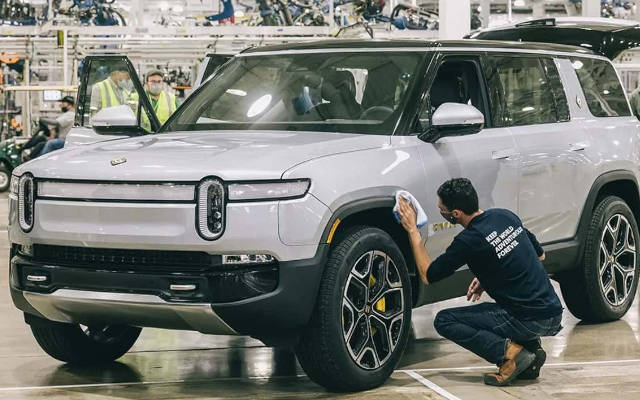 In J.D. Power's 2025 APEAL study, Rivian achieved the highest owner satisfaction score with 896 points, though it was ineligible for an official award. Tesla followed closely with a score of 892. Officially, Porsche ranked highest among premium brands for the second consecutive year with a score of 890, followed by Land Rover and BMW. This highlights strong satisfaction with new EV brands, even as overall satisfaction with non-Tesla EVs declined.
In J.D. Power's 2025 APEAL study, Rivian achieved the highest owner satisfaction score with 896 points, though it was ineligible for an official award. Tesla followed closely with a score of 892. Officially, Porsche ranked highest among premium brands for the second consecutive year with a score of 890, followed by Land Rover and BMW. This highlights strong satisfaction with new EV brands, even as overall satisfaction with non-Tesla EVs declined.Honda Prologue Review: Best-Selling EV Crossover Rising Fast
02 Aug 2025 | Synopsis
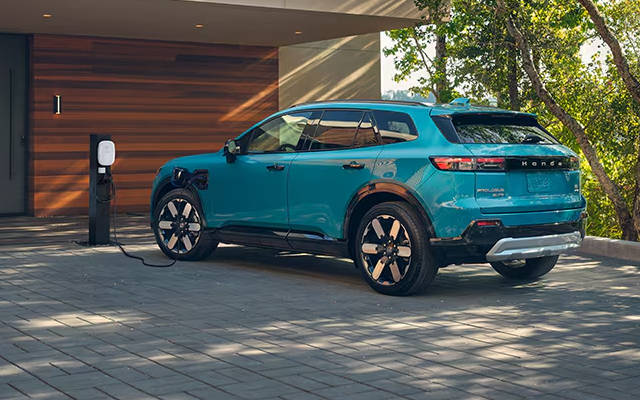 Honda's Prologue, a mid-size electric SUV built on GM's Ultium platform, saw July 2025 sales jump 83% to 6,318 units. Drivers praise its roomy, quiet cabin, smooth ride, and full $7,500 tax credit, while critics cite bland handling, modest cargo space, and 150 kW charging speed. Its comfort, range up to 308 miles, and Honda brand trust are fueling strong demand in the growing EV crossover market.
Honda's Prologue, a mid-size electric SUV built on GM's Ultium platform, saw July 2025 sales jump 83% to 6,318 units. Drivers praise its roomy, quiet cabin, smooth ride, and full $7,500 tax credit, while critics cite bland handling, modest cargo space, and 150 kW charging speed. Its comfort, range up to 308 miles, and Honda brand trust are fueling strong demand in the growing EV crossover market.Honda's Smallest Electric Car Can Power Your Home And More
01 Aug 2025 | Synopsis
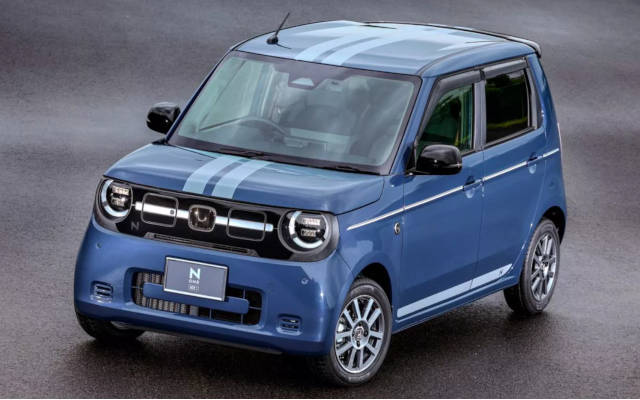 Honda's N-One e is a compact, retro-styled electric city car with a range of over 245 km (150+ mi). Its standout feature is the advanced Vehicle-to-Load (V2L) system, which can power not only small appliances and devices but even a home during a power outage. This functionality requires an optional adapter from Honda. The car supports 50kW DC fast charging, allowing for a quick 30-minute charge.
Honda's N-One e is a compact, retro-styled electric city car with a range of over 245 km (150+ mi). Its standout feature is the advanced Vehicle-to-Load (V2L) system, which can power not only small appliances and devices but even a home during a power outage. This functionality requires an optional adapter from Honda. The car supports 50kW DC fast charging, allowing for a quick 30-minute charge.Elon Musk Is Turning US Liberals Off Not Just Tesla But Electric Vehicles In General
01 Aug 2025 | Synopsis
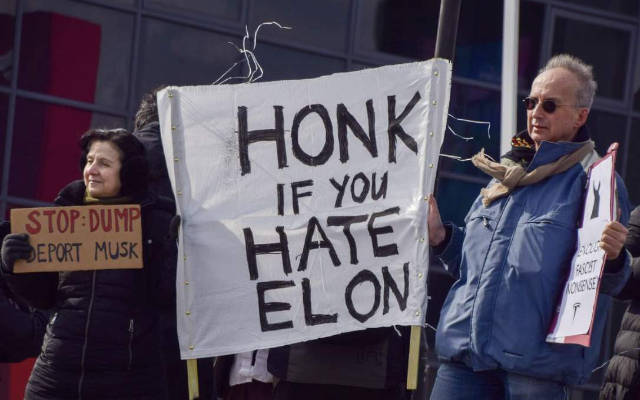 Recent study published in Humanities and Social Sciences Communications journal found Conservatives consistently disfavored purchasing both Teslas and EVs, irrespective of their perceptions of Musk. Liberals showed declining intentions to purchase Teslas compared with other EVs, and, to a lesser extent, declining intentions to purchase EVs in general. We found both effects to be associated with negative perceptions of Musk."
Recent study published in Humanities and Social Sciences Communications journal found Conservatives consistently disfavored purchasing both Teslas and EVs, irrespective of their perceptions of Musk. Liberals showed declining intentions to purchase Teslas compared with other EVs, and, to a lesser extent, declining intentions to purchase EVs in general. We found both effects to be associated with negative perceptions of Musk."For Electric Vehicles, Smaller Is Better
01 Aug 2025 | Synopsis
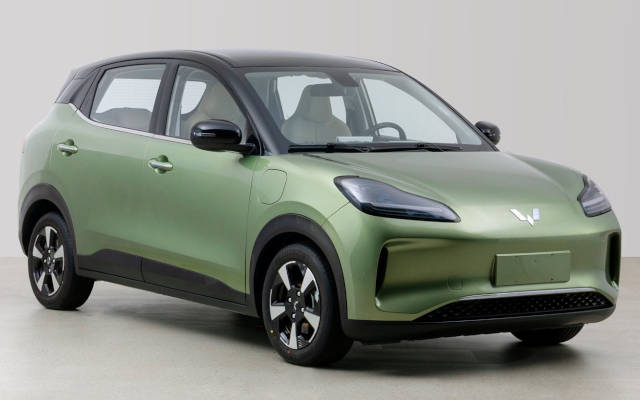 "Electric vehicles (EVs) are crucial for decarbonizing transportation, but the growing trend towards larger models like SUVs and pickup trucks poses a challenge. Smaller EVs consume less energy, require fewer critical minerals for batteries, and are better suited for cities. To ensure the transition to electric mobility is effective and equitable, priority should be given to smaller, more affordable EVs, alongside investments in public transport and active mobility."
"Electric vehicles (EVs) are crucial for decarbonizing transportation, but the growing trend towards larger models like SUVs and pickup trucks poses a challenge. Smaller EVs consume less energy, require fewer critical minerals for batteries, and are better suited for cities. To ensure the transition to electric mobility is effective and equitable, priority should be given to smaller, more affordable EVs, alongside investments in public transport and active mobility."
 EVWorld Exclusive
EVWorld Exclusive
Horse Powertrain: The Hybrid Trojan Horse
17 Oct 2025 |  Horse Powertrain, a joint venture by Renault, Geely, and Aramco, offers compact hybrid engines like the C1 to retrofit EV platforms. Designed as range extenders, these engines run on multiple fuels and meet Euro 7 standards. Though marketed as green tech, their real-world impact is debated - especially as studies show PHEVs are rarely charged. Horse may be a transitional solution, but 500-mile EVs are poised to dominate long-term.
Horse Powertrain, a joint venture by Renault, Geely, and Aramco, offers compact hybrid engines like the C1 to retrofit EV platforms. Designed as range extenders, these engines run on multiple fuels and meet Euro 7 standards. Though marketed as green tech, their real-world impact is debated - especially as studies show PHEVs are rarely charged. Horse may be a transitional solution, but 500-mile EVs are poised to dominate long-term.
Sticker Shock and Stagnant Pay: Why New Cars Are Slipping Out of Reach
17 Oct 2025 |  New car prices have outpaced wage growth, making ownership increasingly unaffordable. Even Ford's $30K EV pickup and other sub-$30K models may remain out of reach for many without incentives or financing reform. With monthly payments rising and federal credits phasing out, the affordability gap is reshaping the auto market. Shared mobility and micro-EVs may offer alternatives, but structural change is needed to restore access.
New car prices have outpaced wage growth, making ownership increasingly unaffordable. Even Ford's $30K EV pickup and other sub-$30K models may remain out of reach for many without incentives or financing reform. With monthly payments rising and federal credits phasing out, the affordability gap is reshaping the auto market. Shared mobility and micro-EVs may offer alternatives, but structural change is needed to restore access.
Toyota FT-Me: Shared Mobility Concept with Big Implications
17 Oct 2025 |  Toyota's FT-Me is a two-seat electric microcar designed for shared urban mobility, not just teens. Developed with UK government support, it features hand-only controls, solar panels, and a lightweight frame. Aimed at car clubs and last-mile use, it could offer affordable, accessible transport with low emissions. With steady utilization and supportive policy, FT-Me may become a viable, sustainable option in the UK's evolving mobility landscape.
Toyota's FT-Me is a two-seat electric microcar designed for shared urban mobility, not just teens. Developed with UK government support, it features hand-only controls, solar panels, and a lightweight frame. Aimed at car clubs and last-mile use, it could offer affordable, accessible transport with low emissions. With steady utilization and supportive policy, FT-Me may become a viable, sustainable option in the UK's evolving mobility landscape.
Creative Destruction vs. Fossil Retrenchment: Why Project 2025 Risks Leaving America Behind
16 Oct 2025 |  Project 2025 protects fossil fuel incumbents by dismantling Biden-era clean energy policies. Nobel economist Philippe Aghion argues that climate progress depends on creative destruction - letting green innovators outcompete legacy polluters. The U.S. risks falling behind as global markets embrace clean tech. Even its passport has slipped from the top 10. Innovation, not retrenchment, is the path forward
Project 2025 protects fossil fuel incumbents by dismantling Biden-era clean energy policies. Nobel economist Philippe Aghion argues that climate progress depends on creative destruction - letting green innovators outcompete legacy polluters. The U.S. risks falling behind as global markets embrace clean tech. Even its passport has slipped from the top 10. Innovation, not retrenchment, is the path forward
Buick Electra E5: China-Built EV Poised for U.S. Launch
16 Oct 2025 |  Buick's Electra E5, built in China by SAIC-GM, is set to become GM's first imported EV for the U.S. market. Though its launch was delayed indefinitely in 2024, a tentative 2026 rollout remains part of GM's electrification roadmap. With Ultium battery tech, strong performance specs, and positive reception in China, the Electra E5 represents a strategic shift in global EV sourcing and branding.
Buick's Electra E5, built in China by SAIC-GM, is set to become GM's first imported EV for the U.S. market. Though its launch was delayed indefinitely in 2024, a tentative 2026 rollout remains part of GM's electrification roadmap. With Ultium battery tech, strong performance specs, and positive reception in China, the Electra E5 represents a strategic shift in global EV sourcing and branding.
SEARCH RSSTREAM
 51 New Postings In Past 24 Hours
51 New Postings In Past 24 Hours
Category:energy
Region:NoAmerica
Date:18 Oct 2025
Category:energy
Region:NoAmerica
Date:18 Oct 2025
Category:mobility
Region:NoAmerica
Date:18 Oct 2025
Category:finance
Region:NoAmerica
Date:18 Oct 2025
Category:mobility
Region:NoAmerica
Date:18 Oct 2025
Category:finance
Region:NoAmerica
Date:18 Oct 2025
Category:finance
Region:NoAmerica
Date:18 Oct 2025
Category:mobility
Region:NoAmerica
Date:18 Oct 2025
Category:finance
Region:NoAmerica
Date:18 Oct 2025
Category:mobility
Region:Europe
Date:18 Oct 2025
Category:mobility
Region:Europe
Date:18 Oct 2025
Category:finance
Region:NoAmerica
Date:18 Oct 2025
Category:autonomy
Region:NoAmerica
Date:18 Oct 2025
Category:mobility
Region:NoAmerica
Date:18 Oct 2025
Category:finance
Region:NoAmerica
Date:18 Oct 2025
Category:policy
Region:NoAmerica
Date:18 Oct 2025
Category:policy
Region:NoAmerica
Date:18 Oct 2025
Category:policy
Region:NoAmerica
Date:18 Oct 2025
Category:policy
Region:NoAmerica
Date:18 Oct 2025
Category:mobility
Region:NoAmerica
Date:18 Oct 2025
